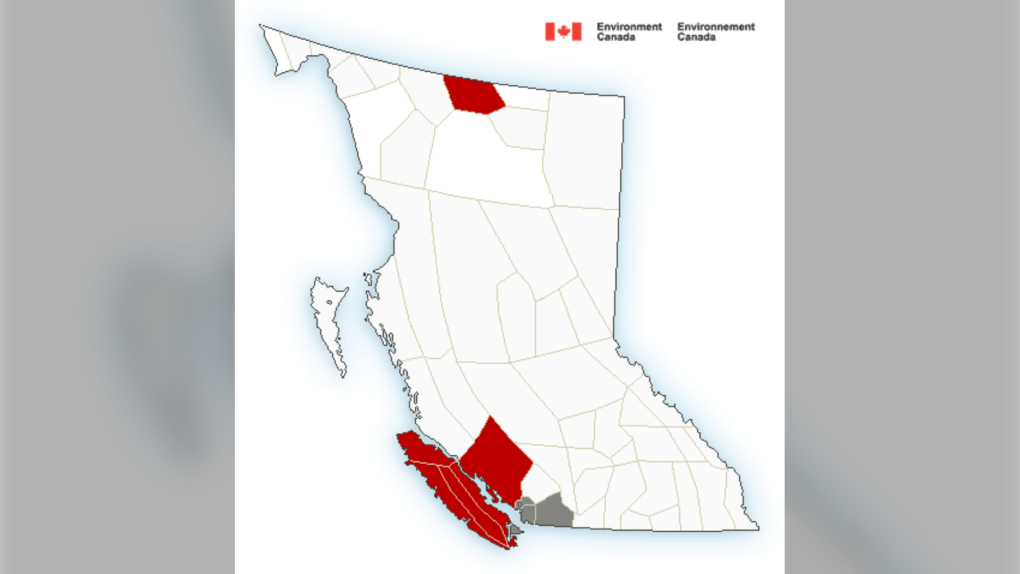Snowfall warnings issued for all of Vancouver Island, up to 20 cm expected inland
 Environment and Climate Change Canada has updated its forecast for Vancouver Island, and is now warning residents that Sunday night's snowfall could be more significant than previously expected.
Environment and Climate Change Canada has updated its forecast for Vancouver Island, and is now warning residents that Sunday night's snowfall could be more significant than previously expected.
Environment and Climate Change Canada has updated its forecast for Vancouver Island, and is now warning residents that Sunday night's snowfall could be more significant than previously expected.
On Saturday, the weather agency issued special weather statements for most of the island and the South Coast of the mainland, saying between two and 10 centimetres of accumulation were possible by Monday morning.
By Sunday, Environment Canada had revised its statements into snowfall warnings for every region of the island - though the only part of Greater Victoria subject to the warnings was the Malahat Highway from Goldstream to Mill Bay.
The weather agency says snowfall amounts between five and 10 centimetres are now expected near the water, with accumulations of 10 to 15 centimetres away from the water, and 15 to 20 centimetres in the region Environment Canada defines as "Inland Vancouver Island."
"Over Inland Vancouver Island, the snow will begin this evening and intensify overnight and continue throughout the day on Monday," the snowfall warning for the region reads.
"Total snowfall accumulations of about 15 to 20 cm is expected by Monday afternoon."
In other parts of the island, the snow is expected to turn to rain mixed with wet snow Monday morning, according to Environment Canada.
"A strong frontal system from the Pacific coupling with cold surface temperatures will bring snow to Vancouver Island tonight and into Monday," the agency said.
"Be prepared to adjust your driving with changing road conditions. Prepare for quickly changing and deteriorating travel conditions. There may be a significant impact on rush hour traffic in urban areas."
CTVNews.ca Top Stories

B.C. tenants evicted for landlord's use after refusing large rent increase to take over neighbouring suite
Ashley Dickey and her mother rented part of the same Coquitlam duplex in three different decades under three different landlords.
Mountain guide dies after falling into a crevasse in Banff National Park
A man who fell into a crevasse while leading a backcountry ski group deep in the Canadian Rockies has died.
Expert warns of food consumption habits amid rising prices
A new survey by Dalhousie University's Agri-Food Analytics Lab asked Canadians about their food consumption habits amid rising prices.
MPP Sarah Jama asked to leave Ontario legislature for wearing keffiyeh
MPP Sarah Jama was asked to leave the Legislative Assembly of Ontario by House Speaker Ted Arnott on Thursday for wearing a keffiyeh, a garment which has been banned at Queen’s Park.
Charlie Woods, son of Tiger, shoots 81 in U.S. Open qualifier
Charlie Woods failed to advance in a U.S. Open local qualifying event Thursday, shooting a 9-over 81 at Legacy Golf & Tennis Club.
Ex-tabloid publisher testifies he scooped up possibly damaging tales to shield his old friend Trump
As Donald Trump was running for president in 2016, his old friend at the National Enquirer was scooping up potentially damaging stories about the candidate and paying out tens of thousands of dollars to keep them from the public eye.
Here's why provinces aren't following Saskatchewan's lead on the carbon tax home heating fight
After Prime Minister Justin Trudeau said the federal government would still send Canada Carbon Rebate cheques to Saskatchewan residents, despite Saskatchewan Premier Scott Moe's decision to stop collecting the carbon tax on natural gas or home heating, questions were raised about whether other provinces would follow suit. CTV News reached out across the country and here's what we found out.
Montreal actress calls Weinstein ruling 'discouraging' but not surprising
A Montreal actress, who has previously detailed incidents she had with disgraced Hollywood producer Harvey Weinstein, says a New York Court of Appeals decision overturning his 2020 rape conviction is 'discouraging' but not surprising.
Caleb Williams, Jayden Daniels and Drake Maye make it four NFL drafts with quarterbacks going 1-3
Caleb Williams is heading to the Windy City, aiming to become the franchise quarterback Chicago has sought for decades.































